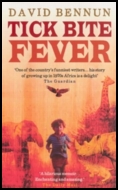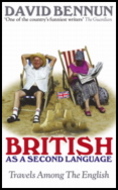| Text to separate 1 |  | Text to separate |  |
| Text to separate 1 | Tick Bite Fever | Text to separate | British As A Second Language |
|
Available now from Ebury Press:
British As A Second Language More details here Click here to buy it Also published by Ebury: Dave's highly acclaimed African memoir Tick Bite Fever |
| Television Reviews for Sunday 1st September [The Mail On Sunday, 2002] WHEN SHE DIED: DEATH OF A PRINCESS Channel 4, Sunday * DIANA'S FUNERAL: FIVE YEARS ON Channel 5, Tuesday ** I'M A CELEBRITY - GET ME OUT OF HERE ITV1, nightly no stars 9/11: THE FIREFIGHTERS' STORY Channel 5, Thursday **** AVENGING TERROR Channel 4, Saturday **** THE AGE OF TERROR Discovery, Wednesday **** BEDTIME BBC1, Monday-Wednesday *** THE DEATH OF Princess Diana now feels like a memory from another age. Its fifth anniversary closely coincides with the first of an altogether more shocking event, which explains the relative paucity of Diana-related TV in the run-up. When She Died: Death Of A Princess was a curious and potentially daring programme. It depicted a selection of citizens responding to the news: a tramp, a middle-aged housewife, a depressed young woman, a loft-dwelling yuppie. The idea being that for many, Diana was an empty vessel into which they might pour their own peculiar fixations and fantasies. Peculiar they certainly were. This lot could not have been odder had they communicated solely through blank verse and modern opera. Which they did. I couldn't work out who this show was for, and I thought that was a shame. The format obscured an intriguing premise. Maybe Channel 4 worried that if people could make sense of it, they wouldn't stand for it. Or it's possible I have it back to front, and the topic was merely a pretext for some painfully highbrow broadcasting. There was nothing obscure or highbrow about Diana's Funeral: Five Years On, which shone its low-watt beam upon shopworn facts so long exposed to daylight that their colours have begun to fade. It offered a few crumbs of originality; principally, an account of how the monarchy survived and learned from the crisis. That brief flurry of analysis could not withstand a pervasive air of romantic fatalism, which portrayed Diana's death as the predestined conclusion to a summer of rebellious histrionics. Sometimes an accident is just an accident, even when it takes away the biggest and best loved celebrity in the world. It was Diana who inadvertently defined the modern celebrity not as somebody who Does, but as somebody who simply Is. The nightmarish, psychobabble-enclosed void known as Geri Halliwell, for example, may not be Diana's fault, but Geri could not have existed without her. And even Geri belongs further up the food chain than the contestants on I'm A Celebrity - Get Me Out Of Here. I can think of at least two things wrong with that title. This chimpanzees' tea party in the outback merits no response other than: No You're Not - For God's Sake Stay Right There. Grief for Diana has also been blamed for a kind of national Oprah-isation, in which American-style touchy-feeliness gushed out of the once buttoned-up British psyche. Whether this is fair on us is arguable, but after watching 9/11: The Firefighters' Story, I've concluded that it certainly isn't fair on the Americans. The mind still reels at the courage of those firemen who climbed the World Trade Centre stairs in the knowledge that they were very unlikely to return. The New York Fire Department lost 343 men that day. The dignity, grace and composure with which NYFD families and comrades bore this anguish is heartbreaking in itself. A father, told that his son's body had been discovered in the ruins, described himself in all sincerity as “fortunate”. “It's a daily thing,” the same man added, quietly, “I'll probably go to my grave with this loss, always missing the physical presence of Mike.” How many of those mourners unknown to her can honestly say the same thing of Diana? It would have taken a rare nincompoop to prevent this film from being humbling and moving; still, credit should go to Paul Berriff for the measured, unobtrusive way he allowed the story to unfold. Dubya's Posse, the first episode of Avenging Terror, illuminated America's reaction to 9/11. The roster of interviewees was remarkable: Tony Blair, Vladimir Putin, Gerhard Schroeder, Pervez Musharraf, much of the Bush cabinet. One suspected that the documentary makers came closer to landing Osama Bin Laden than special forces ever will. The US bigwigs alarmed me. Dick Cheney was plain scary. In both appearance and manner Richard Armitage, Deputy Secretary of State, resembled Colonel Kurtz and Uncle Fester rolled into the same suit. Footage of an emergency cabinet meeting lacked only Peter Sellers in dark glasses and wheelchair. Colin Powell alone appeared to combine sagacity with sanity. He related, straight-faced, how President Bush ordered a break for naptime. Condoleeza Rice recalled: “When we put the map out on the table and looked at where Afghanistan is, the colour drained from everybody's faces.” At this point, the colour was draining from my own face as I realised that on 12 September 2001, George W Bush's chief national security advisor needed a map to find Afghanistan. Jon Blair's equally good The Age Of Terror helps put matters into perspective. The first of four instalments, In The Name Of Liberation, opened with the 1946 bombing of the British headquarters at the King David Hotel, Jerusalem by Zionist militants. Their leader, Menachem Begin, may not have the cachet or iconic status of Mahatma Gandhi, but it is his mode of resistance, and not Gandhi's, which has proved the most influential by far. The interviews were fascinating and disturbing: a catalogue of horrors, of justifications, of rationalizations, in which the terrorists and those they opposed became indistinguishable. A pattern emerged of guerillas armed and trained by future enemies, British and American. Describing Nelson Mandela as, “The most notorious terrorist of the twentieth century” was provocative, but brought home the moral conundrum at the heart of the issue. Who is a terrorist, and who a freedom fighter? The practical lesson seems to be that occupations cannot be sustained, and a movement which acts out the will of the majority cannot fail. Military containment will not defeat it: not in Palestine, not in Malaya, not in Algeria, not in South Africa. We ended with Desmond Tutu lamenting the inability of both sides in the Israeli-Palestinian conflict to grasp the simple fact that neither is going anywhere. What a relief to turn from carnage and explosions to the subtle but sharp-toothed suburban comedy of Bedtime Detailing the late night dialogues in a trio of neighbouring households, this was radio with pictures. You could close your eyes and still enjoy it. An older couple fretted and soothed. A younger couple bickered and made up. A teenage lad seemingly plotted to blow up somebody's house. . . oh, well. It was nice while it lasted. All material on this site is copyrighted © to David Bennun and may not be reprinted or reused without permission. Feel free to ask. Back to Film and TV |
| Text to separate 1 |  | Text to separate |  |
| Text to separate 1 | Tick Bite Fever | Text to separate | British As A Second Language |